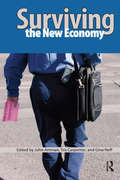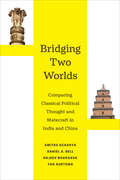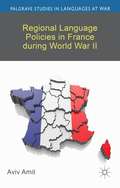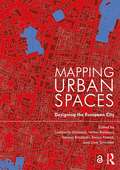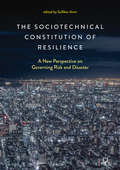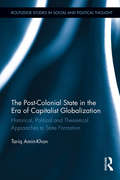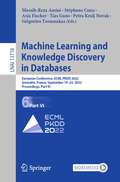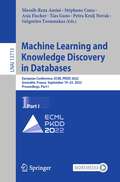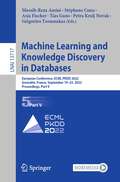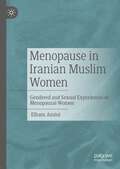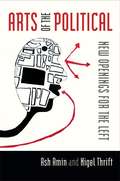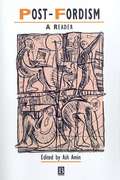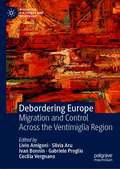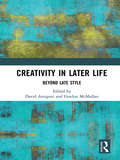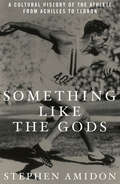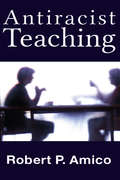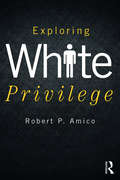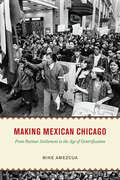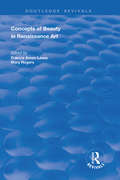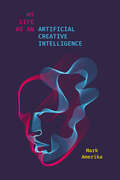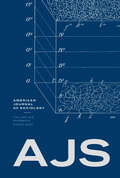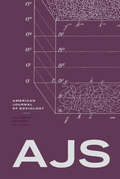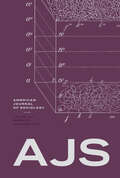- Table View
- List View
Surviving the New Economy
by John Amman Tris Carpenter Gina NeffThe dot-com boom of the late 1990s marked the coming of age of the much-heralded New Economy, an economic, technological, and social transformation that was decades in the making. A highly mobile, and in many cases highly compensated, workforce faces a multitude of new risks: Jobs are no longer secure nor insulated from global competition, employer-provided health benefits are drying up, and retirement planning is almost entirely the responsibility of employees themselves. This timely book examines the challenges facing high-tech workers and other professionals and the relevance of these struggles for the future of the economy. Written by leading experts, Surviving the New Economy shows how people working in technology industries are addressing their concerns via both traditional collective bargaining and through innovative actions. Using case studies from the United States and abroad, the authors in this collection examine how highly skilled workers are surviving in a global economy in which the rules have changed-and how they are reshaping their workplaces in the process.
Bridging Two Worlds: Comparing Classical Political Thought and Statecraft in India and China (Great Transformations #4)
by Amitav Acharya, Daniel A. Bell, Rajeev Bhargava, and Yan XuetongA free open access ebook is available upon publication. Learn more at www.luminosoa.org. The rise of China and India could be the most important political development of the twenty-first century. What will the foreign policies of China and India look like in the future? What should they look like? And what can each country learn from the other? Bridging Two Worlds gathers a coterie of experts in the field, analyzing profound political thinkers from these ancient regions whose theories of interstate relations set the terms for the debates today. This volume is the first work that systematically compares ancient thoughts and theories about international politics between China and India. It is essential reading for anyone interested in the growth of China and India and what it will mean for the rest of the world.
Regional Language Policies in France during World War II
by Aviv AmitDuring Germany's occupation of France in WWII, French regional languages became a way for people to assert their local identities. This book offers a detailed historical sociolinguistic analysis of the various language policies applied in France's regions (Brittany, Southern France, Corsica and Alsace) before, during and after WWII.
Mapping Urban Spaces: Designing the European City
by Lamberto Amistadi Valter Balducci Tomasz Bradecki Enrico Prandi Uwe SchröderMapping Urban Spaces focuses on medium-sized European cities and more specifically on their open spaces from psychological, sociological, and aesthetic points of view. The chapters illustrate how the characteristics that make life in medium-sized European cities pleasant and sustainable – accessibility, ease of travel, urban sustainability, social inclusiveness – can be traced back to the nature of that space. The chapters develop from a phenomenological study of space to contributions on places and landscapes in the city. Centralities and their meaning are studied, as well as the social space and its complexity. The contributions focus on history and theory as well as concrete research and mapping approaches and the resulting design applications. The case studies come from countries around Europe including Poland, Italy, Greece, Germany, and France, among others. The book will be of interest to students, scholars, and practitioners in architecture, urban planning, and landscape architecture.
The Sociotechnical Constitution of Resilience: A New Perspective On Governing Risk And Disaster
by Sulfikar AmirThis book considers the concept of resilience in a global society where coping with the consequence and long term impact of crisis and disaster challenges the capacity of communities to bounce back in the event of severe disruption. Catastrophic events such as the 9.11 terrorist attack, the Fukushima nuclear disaster, and the volcano eruption in Central Java entailed massive devastation on physical infrastructures, and caused significant social and economic damage. This book considers how the modern sociotechnological system facilitating human activity defines how societies survive and whether a crisis will be short-lived or prolonged. Drawing on the concept of sociotechnical resilience, this book closely examines a range of events North America, Asia, Australia, and Europe. By presenting the successes and failures of sociotechnical resilience, it offers important insights and practical lessons to build better and comprehensive understandings of resilience in a real-world setting, significantly contributing to the study of disaster resilience.
The Post-Colonial State in the Era of Capitalist Globalization: Historical, Political and Theoretical Approaches to State Formation (Routledge Studies in Social and Political Thought)
by Tariq Amin-KhanState formation in post-colonial societies differed greatly from the formation of the Western capitalist state. The latter has been extensively studied, while a coherent grasp of the post-colonial state has remained elusive. Amin-Khan provides a critical historical and contemporary understanding of post-colonial state formations in Asia and Africa, and suggests how this process differed from the formation of states in Latin America. In distinguishing between the post-colonial state and the Western capitalist state, the author argues that the unitary colonial state left a strong legacy on the decolonized states of Asia and Africa, reinscribing their subordination vis-à-vis Western states, transnational corporations and multilateral institutions. The indigenous elites' decision at the time of decolonization to retain colonial state structures meant the readaptation of capitalism-imperialism nexus to suit new post-colonial realities, which enabled the formation of clientelist relationships. This post-colonial reality and exploration of the contemporary context provides the basis of analyzing two post-colonial state forms, the capitalist and proto-capitalist varieties, which are examined using the case studies of India and Pakistan.
Machine Learning and Knowledge Discovery in Databases: European Conference, ECML PKDD 2022, Grenoble, France, September 19–23, 2022, Proceedings, Part VI (Lecture Notes in Computer Science #13718)
by Massih-Reza Amini Petra Kralj Novak Grigorios Tsoumakas Stéphane Canu Asja Fischer Tias GunsThe multi-volume set LNAI 13713 until 13718 constitutes the refereed proceedings of the European Conference on Machine Learning and Knowledge Discovery in Databases, ECML PKDD 2022, which took place in Grenoble, France, in September 2022.The 236 full papers presented in these proceedings were carefully reviewed and selected from a total of 1060 submissions. In addition, the proceedings include 17 Demo Track contributions. The volumes are organized in topical sections as follows: Part I: Clustering and dimensionality reduction; anomaly detection; interpretability and explainability; ranking and recommender systems; transfer and multitask learning; Part II: Networks and graphs; knowledge graphs; social network analysis; graph neural networks; natural language processing and text mining; conversational systems; Part III: Deep learning; robust and adversarial machine learning; generative models; computer vision; meta-learning, neural architecture search; Part IV: Reinforcement learning; multi-agent reinforcement learning; bandits and online learning; active and semi-supervised learning; private and federated learning; . Part V: Supervised learning; probabilistic inference; optimal transport; optimization; quantum, hardware; sustainability; Part VI: Time series; financial machine learning; applications; applications: transportation; demo track.
Machine Learning and Knowledge Discovery in Databases: European Conference, ECML PKDD 2022, Grenoble, France, September 19–23, 2022, Proceedings, Part I (Lecture Notes in Computer Science #13713)
by Massih-Reza Amini Stéphane Canu Asja Fischer Tias Guns Petra Kralj Novak Grigorios TsoumakasThe multi-volume set LNAI 13713 until 13718 constitutes the refereed proceedings of the European Conference on Machine Learning and Knowledge Discovery in Databases, ECML PKDD 2022, which took place in Grenoble, France, in September 2022.The 236 full papers presented in these proceedings were carefully reviewed and selected from a total of 1060 submissions. In addition, the proceedings include 17 Demo Track contributions. The volumes are organized in topical sections as follows: Part I: Clustering and dimensionality reduction; anomaly detection; interpretability and explainability; ranking and recommender systems; transfer and multitask learning; Part II: Networks and graphs; knowledge graphs; social network analysis; graph neural networks; natural language processing and text mining; conversational systems; Part III: Deep learning; robust and adversarial machine learning; generative models; computer vision; meta-learning, neural architecture search; Part IV: Reinforcement learning; multi-agent reinforcement learning; bandits and online learning; active and semi-supervised learning; private and federated learning; . Part V: Supervised learning; probabilistic inference; optimal transport; optimization; quantum, hardware; sustainability; Part VI: Time series; financial machine learning; applications; applications: transportation; demo track.
Machine Learning and Knowledge Discovery in Databases: European Conference, ECML PKDD 2022, Grenoble, France, September 19–23, 2022, Proceedings, Part V (Lecture Notes in Computer Science #13717)
by Massih-Reza Amini Stéphane Canu Asja Fischer Tias Guns Petra Kralj Novak Grigorios TsoumakasThe multi-volume set LNAI 13713 until 13718 constitutes the refereed proceedings of the European Conference on Machine Learning and Knowledge Discovery in Databases, ECML PKDD 2022, which took place in Grenoble, France, in September 2022.The 236 full papers presented in these proceedings were carefully reviewed and selected from a total of 1060 submissions. In addition, the proceedings include 17 Demo Track contributions. The volumes are organized in topical sections as follows: Part I: Clustering and dimensionality reduction; anomaly detection; interpretability and explainability; ranking and recommender systems; transfer and multitask learning; Part II: Networks and graphs; knowledge graphs; social network analysis; graph neural networks; natural language processing and text mining; conversational systems; Part III: Deep learning; robust and adversarial machine learning; generative models; computer vision; meta-learning, neural architecture search; Part IV: Reinforcement learning; multi-agent reinforcement learning; bandits and online learning; active and semi-supervised learning; private and federated learning; . Part V: Supervised learning; probabilistic inference; optimal transport; optimization; quantum, hardware; sustainability; Part VI: Time series; financial machine learning; applications; applications: transportation; demo track.
Menopause in Iranian Muslim Women: Gendered and Sexual Experiences of Menopausal Women
by Elham AminiThis book offers an original empirical study into the gendered and sexual experiences of Iranian Muslim women going through menopause. Using a biographical lifecourse lens, it explores the processes through which these experiences are shaped by hegemonic gender norms, as well as how these women express their agency. Centering the voices of Iranian Muslim women, this book links sexuality, ageing, and the body to the matter of menopause, conceived here as a gendered, embodied and lived phenomenon characterised both by cultural constraint and by individual reflexive body techniques. By considering gender and sexuality as vectors of power with internal politics, inequalities, and oppression alongside embodied practice, the author shows how the life course provides a trajectory of sex and sexuality that routes both in time, space, social and cultural context.
Arts of the Political: New Openings for the Left
by Amin Ash Thrift NigelIn the West, "the Left," understood as a loose conglomeration of interests centered around the goal of a fairer and more equal society, still struggles to make its voice heard and its influence felt, even amid an overwhelming global recession. In Arts of the Political: New Openings for the Left, Ash Amin and Nigel Thrift argue that only by broadening the domain of what is considered political and what can be made into politics will the Left be able to respond forcefully to injustice and inequality. In particular, the Left requires a more imaginative and experimental approach to the politics of creating a better society. The authors propose three political arts that they consider crucial to transforming the Left: boosting invention, leveraging organization, and mobilizing affect. They maintain that successful Left political movements tend to surpass traditional notions of politics and open up political agency to these kinds of considerations. In other words, rather than providing another blueprint for the future, Amin and Thrift concentrate their attention on a more modest examination of the conduct of politics itself and the ways that it can be made more effective.
Post-Fordism: A Reader (IJURR Studies in Urban and Social Change Book Series)
by Ash AmimPart analysis of contemporary change and part vision of the future, post-Fordism lends its name to a set of challenging, essential and controversial debates over the nature of capitalism's newest age. This book provides a superb introduction to these debates and their far-reaching implications, and includes key texts by post-Fordism's major theorists and commentators.
Debordering Europe: Migration and Control Across the Ventimiglia Region (Migration, Diasporas and Citizenship)
by Livio Amigoni Silvia Aru Ivan Bonnin Gabriele Proglio Cecilia VergnanoThis contributed volume analyzes in depth how a border area is constantly reshaped as migration policies harden, and what kind of social, political and economic impacts are produced at local and international level. The study is focused on Ventimiglia, an Italian town located 6 km away from the French-Italian border on the gulf of Genoa with a long story of commerce, custom and smuggling activities related to its proximity to the frontier. While several projects have analyzed other symbolic places of the EU migration crisis such as Lampedusa, Calais and Lesvos, there is a severe empirical gap regarding Ventimiglia, a border town at the very geographic core of the Schengen area. This case study may provide emblematic insights into what European migratory movements are currently revealing in terms of the lack of shared responsibility between EU Member States, the EU common asylum system and respect for human rights, with increasing claims for national sovereignty by some Member States.
Creativity in Later Life: Beyond Late Style
by David Amigoni Gordon McMullanThis collection begins with two premises: that our understanding of the nature and forms of creativity in later life remains limited and that dialogue between specialists in gerontology, the arts and humanities can produce the crucial new insights that are so obviously needed. Representing the outcome of ongoing dialogue across the disciplinary divide, the contributions of this volume reflect anew on what we share and how we differ; creating new narratives so as to build an understanding of late-life creativity that goes far beyond the narrow confines of the pervasively received idea of ‘late style’. Creativity in Later Life encompasses a range of personal reflections and discussions of the boundaries of creativity, including: Canonical artistic achievements to community art projects Narratives of carers for those living with dementia Analyses of creative theory Through these insightful chapters, the authors consequently offer an understanding of creativity in later life as varied, socialised and - above all - located in the cultural and economic circumstances of the here and now. This title will appeal to academics, practitioners and students in the various gerontological, arts and humanities fields; and to anyone with an interest in the nature of creativity in later life and the forms it takes.
Something Like the Gods: A Cultural History of the Athlete from Achilles to LeBron
by Stephen AmidonA lively, literary exploration of one of the West's most iconic cultural figures—the athlete Why is the athlete so important to us? Few public figures can dominate the public imagination with such power and authority. Even in our cynical times, when celebrities can be debunked at the speed of light, many still look to athletes as models for our moral and emotional lives. An aging fastballer goes for a few last wins in his final season, and he becomes an exemplar for our daily struggles against time. A top golfer cheats on his wife, and his behavior sparks a symposium on marital fidelity more wideranging than if the lapse had come from a politician or religious leader. Drawing from art, literature, politics, and history, Something Like the Gods explores the powerful grip the athlete has always held on the Western imagination. Amidon examines the archetype of the competitor as it evolved from antiquity to the present day, from athlete-warriors such as Achilles and Ulysses to global media icons like Ali, Jordan, and Tiger Woods. Above all, Something Like the Gods is a lyrical study that will appeal to anyone who has ever imagined themselves in the spikes, boots, or sneakers of our greatest athletes—or wondered why people do.
Anti-Racist Teaching
by Robert P. Amico<P>"Antiracist Teaching" is about awakening students to their own humanity. In order to teach about this awakening one must be in the process of awakening oneself. The author shares personal anecdotes to illustrate the kinds of changes he experienced as a result of his antiracist teaching. His book explores the questions, <br>Why is teaching about racism and white privilege to white students so difficult? <br>and What can educators do to become more effective antiracist teachers for all of their students? <P>Amico examines the cognitive and emotive obstacles that students experience in the classroom and argues that understanding these difficulties can lead to their resolution. He considers a variety of different approaches to antiracist teaching and endorses a dialogic approach. <P>Dialogue is the centerpiece of students classroom experiences; students engage in dialogue at nearly every class meeting. The dialogic approach is effective in a variety of different learning settings from K 12 classrooms, trainings, retreats, workshops, and community organizations to the college classroom. Further, the book discusses how to bring antiracist teaching into the core of university curricula.
Exploring White Privilege
by Robert P. AmicoExploring white privilege is an enterprise few of us who identify as white have attempted. White privilege is a foreign territory to us, although an unpleasantly familiar territory to people of color. At first the exploration can seem threatening, frightening and uncomfortable because, like any exploration, it can shatter the way we look at the world and how we understand ourselves. This book is, in part, a personal exploration of the author’s white privilege and how he sought to transcend it. It is also a sociological analysis of white privilege, drawing upon key social science literature. The book is an invaluable tool for personal and group explorations of racial privilege as well as other forms of privilege, including gender. Exploring White Privilege offers an analysis of white privilege as well as numerous examples of systemic white privilege in the U.S. Amico explains the cognitive and emotive factors that play a role in making it difficult for most white Americans to understand, learn and accept the sociological facts about systemic racism. While white privilege is generally understood as a system that benefits white people, Amico investigates the psychological, social and spiritual costs of white privilege to white people. And with a deeper understanding of how white privilege affects us all, questions of moral responsibility and accountability are investigated through personal anecdotes.? The author offers a moral argument that is a call to action within our individual spheres of influence. The benefits of such a commitment to action are then explored and compared to the costs of inaction. Exploring white privilege can lead to social change. Amico offers a variety of tools for the reader interested in such explorations of their white privilege.
Making Mexican Chicago: From Postwar Settlement to the Age of Gentrification (Historical Studies of Urban America)
by Mike AmezcuaAn exploration of how the Windy City became a postwar Latinx metropolis in the face of white resistance. Though Chicago is often popularly defined by its Polish, Black, and Irish populations, Cook County is home to the third-largest Mexican-American population in the United States. The story of Mexican immigration and integration into the city is one of complex political struggles, deeply entwined with issues of housing and neighborhood control. In Making Mexican Chicago, Mike Amezcua explores how the Windy City became a Latinx metropolis in the second half of the twentieth century. In the decades after World War II, working-class Chicago neighborhoods like Pilsen and Little Village became sites of upheaval and renewal as Mexican Americans attempted to build new communities in the face of white resistance that cast them as perpetual aliens. Amezcua charts the diverse strategies used by Mexican Chicagoans to fight the forces of segregation, economic predation, and gentrification, focusing on how unlikely combinations of social conservatism and real estate market savvy paved new paths for Latinx assimilation. Making Mexican Chicago offers a powerful multiracial history of Chicago that sheds new light on the origins and endurance of urban inequality.
Making Mexican Chicago: From Postwar Settlement to the Age of Gentrification (Historical Studies of Urban America)
by Mike AmezcuaAn exploration of how the Windy City became a postwar Latinx metropolis in the face of white resistance. Though Chicago is often popularly defined by its Polish, Black, and Irish populations, Cook County is home to the third-largest Mexican-American population in the United States. The story of Mexican immigration and integration into the city is one of complex political struggles, deeply entwined with issues of housing and neighborhood control. In Making Mexican Chicago, Mike Amezcua explores how the Windy City became a Latinx metropolis in the second half of the twentieth century. In the decades after World War II, working-class Chicago neighborhoods like Pilsen and Little Village became sites of upheaval and renewal as Mexican Americans attempted to build new communities in the face of white resistance that cast them as perpetual aliens. Amezcua charts the diverse strategies used by Mexican Chicagoans to fight the forces of segregation, economic predation, and gentrification, focusing on how unlikely combinations of social conservatism and real estate market savvy paved new paths for Latinx assimilation. Making Mexican Chicago offers a powerful multiracial history of Chicago that sheds new light on the origins and endurance of urban inequality.
Concepts of Beauty in Renaissance Art (Routledge Revivals)
by Francis Ames-Lewis Mary RogersIn this Volume, published in1998, Fifteen scholars reveal the ways of preserving, conceiving and creating beauty were as diverse as the cultural influenced at work at the time, deriving from antique, medieval and more recent literature and philosophy, and from contemporary notions of morality and courtly behaviour. Approaches include discussion of contemporary critical terms and how these determined writers’ appreciation of paintings, sculpture, architecture and costume; studies of the quest to create beauty in the work of artists such as Botticeli, Leonardo, Raphael, Parmigianino and Vasari; and the investigation of changes functioning of the eye and brain, or to technical innovations like those found in Venetian glass.
My Life as an Artificial Creative Intelligence (Sensing Media: Aesthetics, Philosophy, and Cultures of Media)
by Mark AmerikaA series of intellectual provocations that investigate the creative process across the human-nonhuman spectrum. Is it possible that creative artists have more in common with machines than we might think? Employing an improvisational call-and-response writing performance coauthored with an AI text generator, remix artist and scholar Mark Amerika, interrogates how his own "psychic automatism" is itself a nonhuman function strategically designed to reveal the poetic attributes of programmable worlds still unimagined. Through a series of intellectual provocations that investigate the creative process across the human-nonhuman spectrum, Amerika critically reflects on whether creativity itself is, at root, a nonhuman information behavior that emerges from an onto-operational presence experiencing an otherworldly aesthetic sensibility. Amerika engages with his cyberpunk imagination to simultaneously embrace and problematize human-machine collaborations. He draws from jazz performance, beatnik poetry, Buddhist thought, and surrealism to suggest that his own artificial creative intelligence operates as a finely tuned remix engine continuously training itself to build on the history of avant-garde art and writing. Playful and provocative, My Life as an Artificial Creative Intelligence flips the script on contemporary AI research that attempts to build systems that perform more like humans, instead self-reflexively making a very nontraditional argument about AI's impact on society and its relationship to the cosmos.
American Sociological Association Style Guide (Fifth Edition)
by American Sociological AssociationThe ASA Style Guide highlights and features guidelines for the most common situations encountered by authors and editors in the ASA journal publication process. It is designed to serve as the authoritative reference for writing, submitting, editing, and copy editing manuscripts for ASA journals. The Guide also serves a wider community of researchers, writers, and pub¬lishers who use it to prepare and present scholarly papers in other sociological and social science venues.
American Journal of Sociology, volume 126 number 5 (March 2021)
by American Journal of SociologyThis is volume 126 issue 5 of American Journal of Sociology. American Journal of Sociology (AJS) presents pathbreaking work from all areas of sociology, with an emphasis on theory building and innovative methods. AJS strives to speak to the general sociology reader and is open to contributions from across the social sciences—sociology, political science, economics, history, anthropology, and statistics—that seriously engage the sociological literature to forge new ways of understanding the social. AJS offers a substantial book review section that identifies the most salient work of both emerging and enduring scholars of social science. Commissioned review essays appear occasionally, offering readers a comparative, in-depth examination of prominent titles.
American Journal of Sociology, volume 127 number 1 (July 2021)
by American Journal of SociologyThis is volume 127 issue 1 of American Journal of Sociology. American Journal of Sociology (AJS) presents pathbreaking work from all areas of sociology, with an emphasis on theory building and innovative methods. AJS strives to speak to the general sociology reader and is open to contributions from across the social sciences—sociology, political science, economics, history, anthropology, and statistics—that seriously engage the sociological literature to forge new ways of understanding the social. AJS offers a substantial book review section that identifies the most salient work of both emerging and enduring scholars of social science. Commissioned review essays appear occasionally, offering readers a comparative, in-depth examination of prominent titles.
American Journal of Sociology, volume 127 number 2 (September 2021)
by American Journal of SociologyThis is volume 127 issue 2 of American Journal of Sociology. American Journal of Sociology (AJS) presents pathbreaking work from all areas of sociology, with an emphasis on theory building and innovative methods. AJS strives to speak to the general sociology reader and is open to contributions from across the social sciences—sociology, political science, economics, history, anthropology, and statistics—that seriously engage the sociological literature to forge new ways of understanding the social. AJS offers a substantial book review section that identifies the most salient work of both emerging and enduring scholars of social science. Commissioned review essays appear occasionally, offering readers a comparative, in-depth examination of prominent titles.
